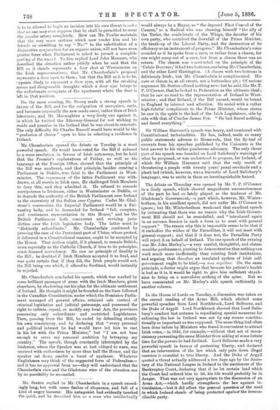Mr. Chamberlain concluded his speech, which was marked by some
brilliant passages of arms with the Irish Members, given elsewhere, by shadowing out his plan for the ultimate settlement of Ireland. He thought it might be founded on the lines followed in the Canadian Constitution, under which the Dominion Parlia- ment managed all general affairs, retained sole control of criminal legislation and judicial patronage, and possessed the right to initiate, repeal, or modify any local Act, the provinces possessing only subordinate and restricted Legislatures. Then, passing from the Bill, he ended by defending stoutly his own consistency, and by declaring that "every personal and political interest he had would have led him to cast in his lot with the Prime Minister," but "I am not base enough to serve my personal ambition by betraying my country." The speech, though constantly interrupted by the Irishmen, whom the Speaker was at last obliged to warn, was received with enthusiasm by more than half the House, and the speaker sat down amidst a burst of applause. Whatever Englishmen may think of the suggested form of Federalism— and it has no approval from us—they will understand that the Chamberlain view and the Gladstone view of the situation can by no possibility be reconciled.


































 Previous page
Previous page